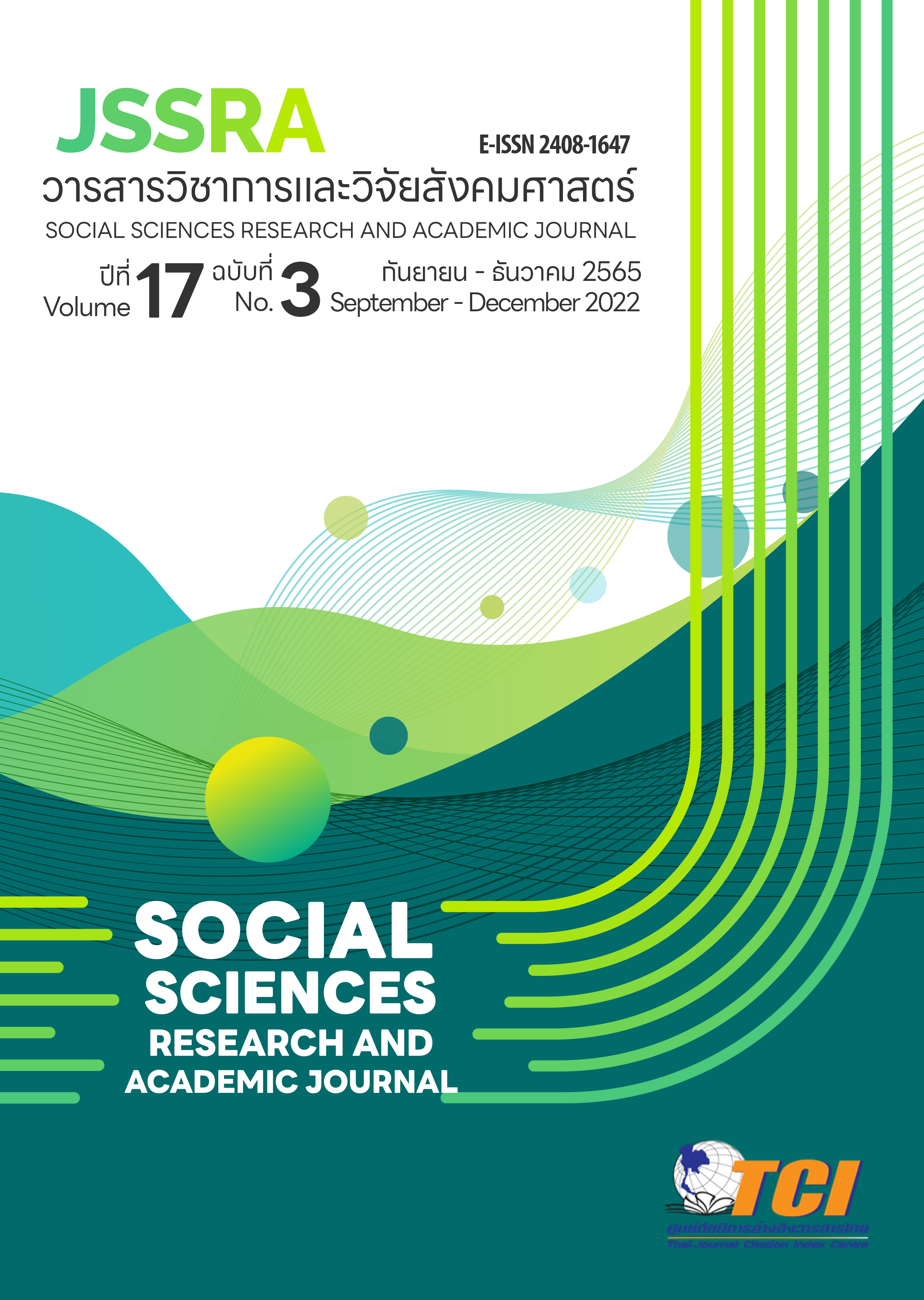ผลของโปรแกรมการให้คำปรึกษาต่อปัญหาสุขภาพจิตของนักเรียน นักศึกษา ในประเทศไทย : การวิเคราะห์อภิมาน The Effect of Counseling Program on Mental Health Problems of Students in Thailand: A Meta-analysis
Main Article Content
Abstract
การศึกษาครั้งนี้มีวัตถุประสงค์เพื่อวิเคราะห์ขนาดอิทธิพลของประสิทธิผลการให้คำปรึกษาที่มีต่อปัญหาสุขภาพจิตของนักเรียน นักศึกษา และเปรียบเทียบปัจจัยด้านแนวคิด/ทฤษฎีและรูปแบบการให้คำปรึกษา คุณลักษณะงานวิจัยต่อขนาดอิทธิผลของประสิทธิผลการให้คำปรึกษา ด้วยการวิเคราะห์อภิมานโปรแกรมการให้คำปรึกษาต่อปัญหาสุขภาพจิต ได้แก่ ความเครียด ความวิตกกังวล และภาวะซึมเศร้าในกลุ่มนักเรียนและนักศึกษาในไทย จำนวน 34 เรื่อง มีนักเรียนและนักศึกษา จำนวน 688 คน โดยเป็นงานวิจัยที่ศึกษาในกลุ่มนักเรียน 18 งานวิจัย มีนักเรียนรวมทั้งสิ้น 442 คน และเป็นงานวิจัยในกลุ่มนักศึกษา 16 งานวิจัย มีนักศึกษารวมทั้งสิ้น 276 คน ดำเนินการวิเคราะห์อภิมานเพื่อพรรณนาและเปรียบเทียบค่าขนาดอิทธิพลด้วยคุณลักษณะของงานวิจัยที่แตกต่างกัน ผลการศึกษา พบว่า ประเภทของปัญหาสุขภาพจิตส่วนใหญ่เป็นงานวิจัยที่ศึกษาเกี่ยวกับโปรแกรมการให้คำปรึกษาเรื่องภาวะซึมเศร้า ร้อยละ 41.2 (n=14) ถัดมาคืองานวิจัยที่ศึกษาเกี่ยวกับโปรแกรมการให้คำปรึกษาเรื่องความวิตกกังวลและความเครียดเท่ากัน ร้อยละ 29.1 (n=10) คุณภาพงานวิจัยโดยรวมมีค่าเฉลี่ย 2.94 (คุณภาพดี) ค่าขนาดอิทธิพลโดยรวมโปรแกรมการให้คำปรึกษา (overall mean effect size) เท่ากับ -1.14 (S.D. = 0.11) (อิทธิพลขนาดใหญ่) และแนวคิดการให้คำปรึกษากลุ่มปัญญาและพฤติกรรมนิยมมีค่าขนาดอิทธิพล (Hedges' g =-1.25) ใกล้เคียงกับแนวคิดกลุ่มมนุษยนิยม (Hedges' g=-1.06) และรูปแบบการให้คำปรึกษารายบุคคล (Hedges' g=-1.23) มีค่าขนาดอิทธิพลสูงกว่าแบบกลุ่ม (Hedges' g=-1.12)
This study Objective To analyze the effect size of counseling programs on students' mental health problems and compare the characteristics of the theory of counseling, type of counseling, and research design including sample group, experimental design, and session. Meta-analysis reseach for mental health problem; stress, anxiety, and depression. This study was studied in 34 papers, group of students by using 688 participants involved. The researches were divided into two groups composed of 18 researches having 442 students and 16 researches having 276 collegians respectively. In this research, the meta-analysis method was used to describe and compare the effect size among the characteristics of each study. The results found that the research on the counseling programs for depression were 41.18% (n=14), and for anxiety were the same as the stress that was 29.14% (n=10). Apart from above, the average of the overall researches was 2.94 (high quality) and the average of the effect size (Hedges'g), the largest effect, was -1.14 (S.D) 0.11. In the theory part, the Cognitive and Behavioral approaches had an effect size (Hedges' g=-1.25) be similar to the Humanist approach (Hedges' g =-1.06). Additionally, the Individualized counseling (Hedges' g=-1.23) had a higher effect size than the group counseling.
Article Details
References
กรมสุขภาพจิต. (2563). รายงานผู้ป่วยมารับบริการด้านจิตเวช ประจำปี 2559 – 2562. Retrieved from https://www.dmh.go.th/report/datacenter/hdc/
กุลนาถ คงเหล่. (2557). ผลของการปรึกษาเชิงจิตวิทยาแบบกลุ่มตามทฤษฎีการพิจารณาเหตุผล อารมณ์และพฤติกรรมที่มีต่อความเครียดของนักศึกษาสภาพรอพินิจระดับปริญญาตรี มหาวิทยาลัยหาดใหญ่. ปริญญานิพนปริญญามหาบัณฑิต. มหาวิทยาลัยทักษิณ, สงขลา.
เจียรนัย ทรงชัยกุลและโกศล มีคุณ. (2554). ทฤษฎีและแนวปฏิบัติในการให้การปรึกษาแบบพิจารณาเหตุผล อารมณ์ และพฤติกรรม. ใน ผ่องพรรณ เกิดพิทักษ์ (บรรณาธิการ), ประมวลสาระชุดวิชาแนวคิดทางการแนะแนวและทฤษฎีการปรึกษาเชิงจิตวิทยา. นนทบุรี: โรงพิมพ์สุโขทัยธรรมาธิราช.
ณัฐิกา ราชบุตรและคณะ. (2561). ผลของโปรแกรมออกกำลังกายเชิงประยุกต์ต่อการป้องกันปัญหาสุขภาพจิต ของนักศึกษาพยาบาลมหาวิทยาลัยราชภัฏชัยภูมิ. วารสารโรงพยาบาลสกลนคร, 22(1), 76-85.
ณัทธร พิทยรัตน์เสถียร. (2558). Cognitive Bbehavior Therapy. กรุงเทพฯ: เอกสารประกอบการสอน.
นงลักษณ์ วิรัชชัย. (2542). การวิเคราะห์อภิมาน. กรุงเทพฯ: นิชินแอดเวอร์ไทซิ่งกรุ๊ป.
เบญจวรรณ บุณยะประพันธ์. (2544). การสังเคราะห์งานวิจัยด้านการให้คำปรึกษาในประเทศไทย. ปริญญานิพนธ์มหาบัณฑิต. มหาวิทยาลัยบูรพา, ชลบุรี.
พงษ์พันธ์ พงษ์โสภาและวิไลลักษณ์ พงษ์โสภา. (2556). ทฤษฎีและเทคนิคการให้บริการปรึกษา. กรุงเทพฯ: สำนักพิมพ์แห่งจุฬลงกรณ์มหาวิทยาลัย.
พรรณปพร ลีวิโรจน์ และ อรวรรณ คุณสนอง. (2559). สำนักงานปัจจัยที่มีความสัมพันธ์ต่อพฤติกรรมการสูบบุหรี่ และผลการพัฒนาโปรแกรมการปรับความคิดและพฤติกรรม เพื่ลดการสูบ บุหรี่ในวัยรุ่นนอกระบบการศึกษา. กองทุนสนับสนุนการสร้างเสริมสุขภาพ (สสส.), กรุงเทพฯ.
มัญชรี โชติรสฐิติ. (2556). การปรับตัวข้ามวัฒนธรรมของนักเรียนไทยในต่างประเทศ. หลักสูตรศิลปศาสตรมหาบัณฑิต สาขาวิชาการสื่อสารประยุกต์ คณะภาษาและการสื่อสาร. สถาบันบัณฑิตพัฒนบริหารศาสตร์.
วัชรี ทรัพย์มี. (2556). ทฤษฎีให้บริการปรึกษา. กรุงเทพฯ: โรงพิมพ์จุฬาลงกรณ์มหาวิทยาลัย.
Aaron Temkin Beck. (1979). Cognitive therapy of depression: Guilford press.
American Addiction Centers. (2021). Psychotherapy Guide: Group Therapy vs. Individual Therapy. Retrieved from https://americanaddictioncenters.org/therapy-treatment/group-individual
Bruijniks, S. J., DeRubeis, R. J., Hollon, S. D., & Huibers, M. J. (2019). The potential role of learning capacity in cognitive behavior therapy for depression: a systematic review of the evidence and future directions for improving therapeutic learning. Clinical Psychological Science, 7(4), 668-692.
Cohen, J. (2013). Statistical power analysis for the behavioral sciences. Academic press.
Corey, G. (2015). Theory and practice of group counseling: Cengage Learning. California: Brooks Cole.
Cuijpers, P., Berking, M., Andersson, G., Quigley, L., Kleiboer, A., & Dobson, K. S. (2013). A meta-analysis of cognitive-behavioural therapy for adult depression, alone and in comparison with other treatments. The Canadian Journal of Psychiatry, 58(7), 376-385.
Glasser, W. (2001). Counseling with choice theory: The new reality therapy: Harper Collins.
Huang, J., Nigatu, Y. T., Smail-Crevier, R., Zhang, X., & Wang, J. (2018). Interventions for common mental health problems among university and college students: A systematic review and meta-analysis of randomized controlled trials. Journal of psychiatric research, 107, 1-10.
Jo, H.-S., Lee, Y.-B., Kim, Y.-H., & Huh, M.-R. (2019). Effects of REBT Applied Horticultural Activity Program on Irrational Beliefs, Job-Seeking Stress, and Career Maturity of University Students. Journal of People, Plants, and Environment, 22(6), 601-609.
Kessler RC et al. (2007). Age of onset of mental disorders: a review of recent literature. Curr Opin Psychiatry, 20(4).
Leahy, R. L. (2002). Cognitive Therapy: Current. Clinical advances in cognitive psychotherapy: Theory and application, 418.
Oud, M., De Winter, L., Vermeulen-Smit, E., Bodden, D., Nauta, M., Stone, L., Kendall, T. (2019). Effectiveness of CBT for children and adolescents with depression: A systematic review and meta-regression analysis. European psychiatry, 57, 33-45.
Paola Pedrelli, c. a. M. N., Albert Yeung, Courtney Zulauf, and Timothy Wilens. (2015). College Students: Mental Health Problems and Treatment Considerations. Acad Psychiatry, 39(5), 503-511.
Scher, C., Segal, Z., & Ingram, R. (2004). Beck's Theory of Depression. Contemporary cognitive therapy: Theory, research, and practice, 27-44.
White, J. R., & Freeman, A. S. (2000). Cognitive-behavioral group therapy: For specific problems and populations: American Psychological Association.


